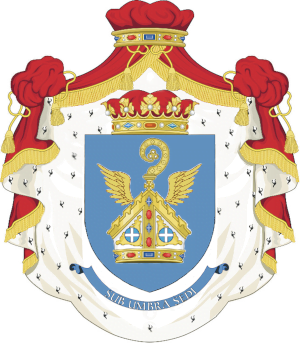In the year 1259, on 13 May in Anagni, Pope Alexander IV issued the Bull “Abbati Monasterii euisque fratibus”.
This bull confirmed the privileges, goods and rights possessed by the Abbey of Lerino, confirming that the Monastery was subject only to the Apostolic See, effectively instituting the right of “Nullios Diocesis”, forbidding any clerical authority to interfere with the management of the Abbey directly linked to the Holy See. It states verbatim: “We forbid any harassment by archbishops, bishops, archdeacons and any ecclesiastical person…”
With this authority, the monks of the Abbey of Lerino, not being able to establish a principality on the island, since it belonged to the territories of the Holy Roman Empire, were able to make use of this total autonomy, establishing two priories, one in Seborga and one at the Chaplaincy of San Michele in Ventimiglia. These territories were declared by Count Guido in the deed of donation to the monks of Lerino back in 954: “libero et mero imperio” (free and mere empire): hence it can be said that the birth of the Principality of Seborga is of exclusively papal origin, not imperial as others claim without historical proof. For this reason, from 1261 each abbot was entitled to attribute to himself, with papal authorisation, the title of Prince of Seborga, assigning to Seborga and the Grange, their aristocratic predicate, as deputies of the authority of the Holy See over the Monastery. The Abbot of Seborga, as Prince, did not depend on the secular clergy but only on the Pope: he directed the parishes in the territory and appointed the provost (prior) of Seborga and of the Chaplaincy of San Michele in Ventimiglia, pertaining to Seborga.
Following the constitution of the Abbey Principality of Seborga in 1261 and as a result of the papal bull of Alexander IV in 1259, the abbot princes reigned in Seborga until 1729 as a result of the right of “nullius diocesis”, exercised in free territories of the Empire.
(Taken from the book “Il Principato Abbaziale di Seborga” (The Abbey Principality of Seborga), a collection of studies by His Most Reverend Highness Giovanni Luca di Seborga, currently being published).


